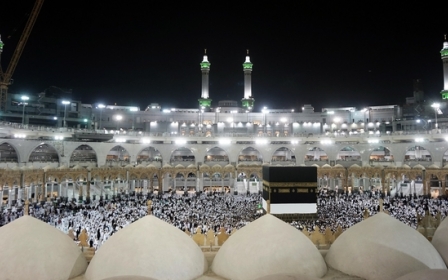VIDEO: Saudi minister praises Israel for 'allowing' Muslims to attend Hajj
Saudi Minister of Religious Endowments Abdullatif al-Sheikh praised Israel for "allowing" its Muslim citizens to go on this year's Hajj pilgrimage, a video shared widely online on Tuesday has revealed.
The comments come at a time when Saudi Arabia is thought to be moving closer to Israel, aided by the two countries' increasing alarm over Iranian activity in the region.
Sheikh appears to make a dig at his country's rival, Qatar, too, whose nationals are unable to travel to Mecca and Medina for Islam's holiest pilgrimage because of tensions between the two Gulf states.
"What has caused some surprise is that the state of Israel, which we know a lot about, did not prevent Muslim pilgrims from coming to Saudi Arabia to perform the pilgrimage," Sheikh said in the video, which was quickly shared by the Israeli foreign ministry's Arabic Twitter account.
Translation: All praise to God, Israel has facilitated the journeys of more than 4,000 Muslim citizens of the country to the holy land to perform the Hajj pilgrimage.
The minister is also heard reprimanding a “certain country” for preventing their pilgrims from making the trip to Saudi Arabia.
While Sheikh did not specify the country, users took what he said to be aimed at Qatar, which has been the subject of a year-long siege by a Saudi-led quartet of states.
"I consider this a really great error on the part of whoever did this," Sheikh said.
"No one can be prevented from Hajj, and no one can be forbidden from worshipping God. And whoever has done this deserves punishment from God sooner rather than later."
Earlier this month, Saudi Arabia accused Qatar of blocking registration links for Qatari pilgrims to Mecca.
However, Qatar’s National Human Rights Committee claimed that the Gulf kingdom had shut down an electronic system used to obtain permits for pilgrims from Qatar.
"There is no chance this year for Qatari citizens and residents to travel for Hajj," Abdullah al-Kaabi, the head of the committee, told Reuters.
"Registration of pilgrims from the state of Qatar remains closed, and residents of Qatar cannot be granted visas as there are no diplomatic missions."
Saudi Arabia has maintained that Qatari pilgrims are welcome to travel to the kingdom to perform Hajj on the condition they arrive on any airline other than Qatar Airways. The land border between the two countries has remained closed for this year’s Hajj season, and Riyadh plans to dig a canal along it, effectively detaching Qatar from the Arabian Peninsula.
The 14-month Gulf crisis has pitted Saudi Arabia, the United Arab Emirates, Egypt and Bahrain against Qatar. The quartet broke off relations with Doha last June, accusing it of supporting Iran and backing terrorist groups - claims Qatar denies.
Earlier this month, Saudi Arabia said it would provide Hajj visas for Qatari nationals on arrival, according to UAE daily the National.
Qatari citizens will be able to obtain permits at the King Abdulaziz airport in Jeddah, in spite of the diplomatic dispute between Riyadh and Doha, the National said.
Saudi Arabia said the Qatari government is using the issue for political ends and it "rejects any effort to politicise the Hajj or drag political differences" into the pilgrimage, the official said, speaking on condition of anonymity.
But three travel agencies in Doha told Reuters they had stopped trying to sell Hajj packages, which can cost as much as $33,000.
Saudi Arabia and Iran are involved in proxy wars, including in Yemen and Syria, and there have been tensions between the two over the Hajj in the past.
This article is available in French on Middle East Eye French edition.
Stay informed with MEE's newsletters
Sign up to get the latest alerts, insights and analysis, starting with Turkey Unpacked
Middle East Eye delivers independent and unrivalled coverage and analysis of the Middle East, North Africa and beyond. To learn more about republishing this content and the associated fees, please fill out this form. More about MEE can be found here.




